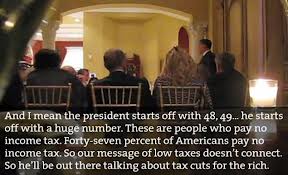 Mitt Romney really hit the jackpot this time, caught on video tape callously dismissing half the population of America as not worth his time because they don’t pay taxes.
Mitt Romney really hit the jackpot this time, caught on video tape callously dismissing half the population of America as not worth his time because they don’t pay taxes.
As “The Caucus” blog in The New York Times pointed out today, in fact it’s only 18% of Americans who pay no federal or payroll taxes. And of those, “more than half were elderly and more than a third were not elderly but had income under $20,000.”
What a way to make a winning pitch to potential donors in the 1%. Let’s just throw all those poor old folks under a bus, shall we? Are there no workhouses?
Ripostes like this have been coming in fast and heavy for the past 24 hours, since the incriminating video clip first appeared on the Mother Jones website, and thence made its way virally around the Web.
What I think has been insufficiently analyzed so far is the provenance of this video.
Today in my media studies class, we were talking about how the old media model, what the textbooks call “legacy media,” is crumbling, to be replaced by myriads of web-based information producers, often referred to as “citizen journalists.”
The guy who released that covert video of Mitt Romney talking up a GOP horse’s ass was a citizen journalist of a sort.
We still don’t know exactly who shot the film, but we do know that it was sent to Mother Jones by James Carter, a grandson of former President Jimmy Carter.
The point is, these are obviously very different channels of information flow than scripted “press conferences,” or even the kind of access granted to card-carrying members of the mainstream media.
The video has so captured the attention of America because it affords us a ringside seat in the inner echelons of political power. Next thing you know, someone will be shooting video (or at least making a covert audio recording) of the proceedings of a closed-door Goldman Sachs board meeting.
Hey, Richard Nixon was the master of this kind of bugging. Let us not forget Watergate, or the Oval Office recordings.
But now the tables are turned, and the technology genie is out of the brass lamp and running gleefully through the land.
No longer are wiretaps and tiny voice recorders the provenance of James Bond and the FBI. Now anyone with a bit of tech smarts and some fortuitous access to the workings of power can record what goes on there, and send it out for the masses to interpret as they see fit.
Last week it was the crazy anti-Muslim film, cheaply and poorly produced but sent out like a message in a bottle on the high seas of the internet, which washed ashore in the Middle East and provided the spark for a new round of anti-American violence.
This week it’s a citizen journalist with a Flip cam in his pocket, pulling back the screen in the GOP Emerald (cash-green, that is) Palace to reveal the true face of the mean-spirited man who would be the Republican President.
As a teacher of media studies in the 21st century, I am excited by the possibilities that my students will enjoy of leaping past the old gatekeepers and getting their investigative work out to the public.
I’m also not quite sure how they are going to make a living doing it—that’s one small detail that remains to be worked out.
But one thing is sure: in this day and age, it is going to be a lot harder for a politician to maintain a public image that is at odds with who he really is when he’s at home.
I hope that means that the next generation of politicians is going to have to be—gasp!—sincere.
